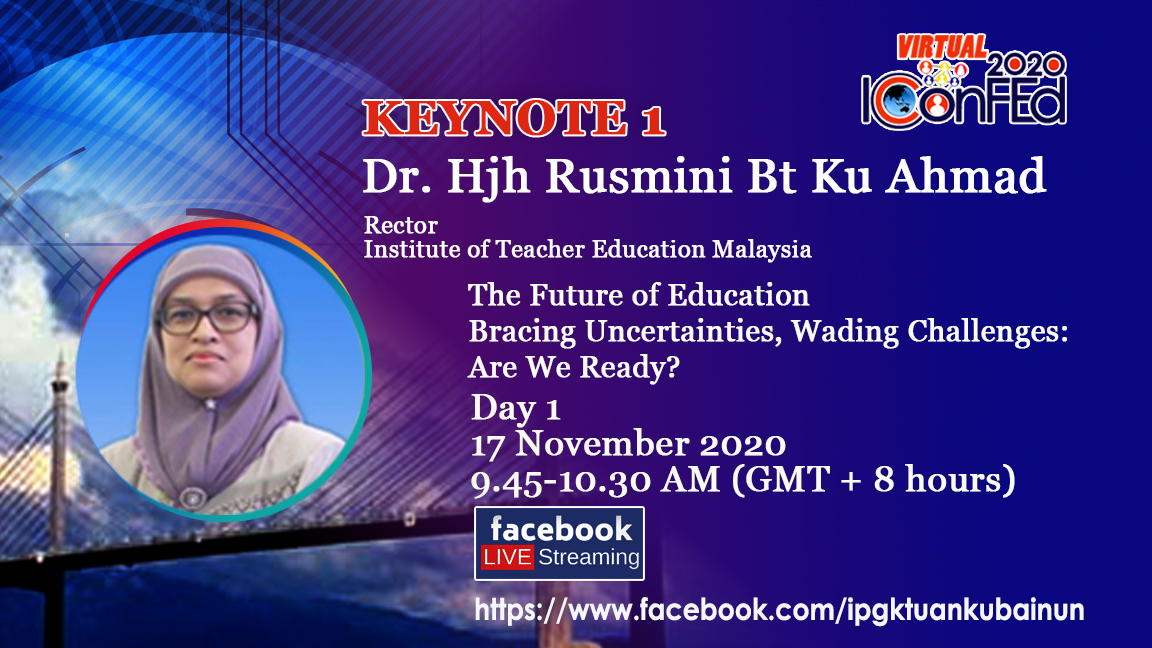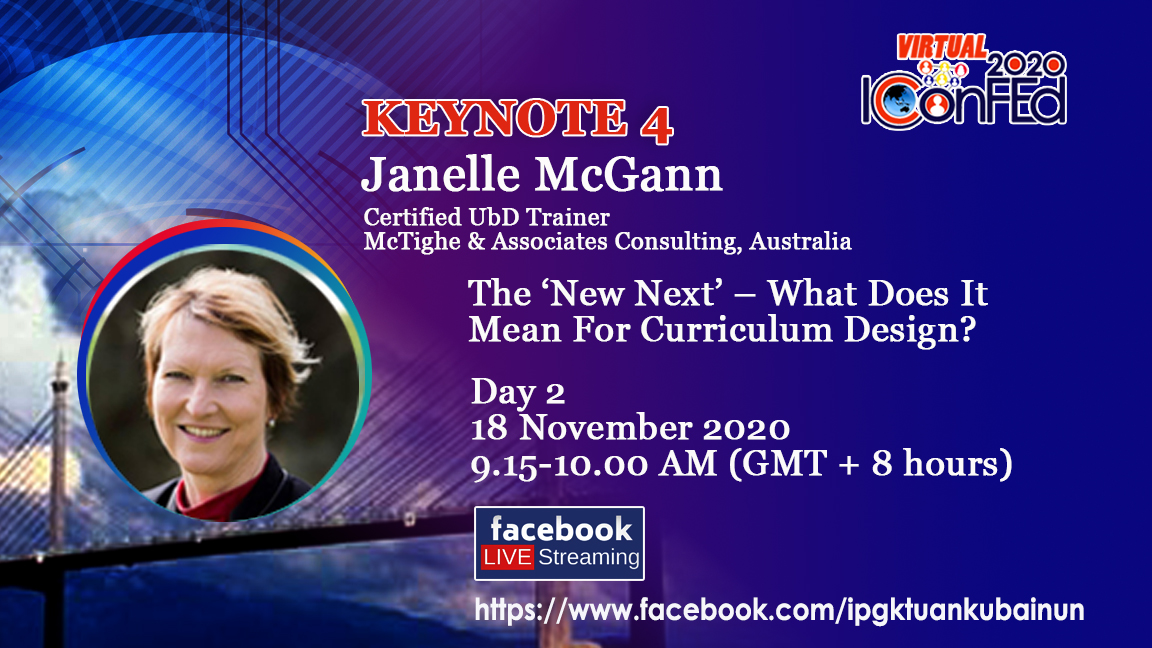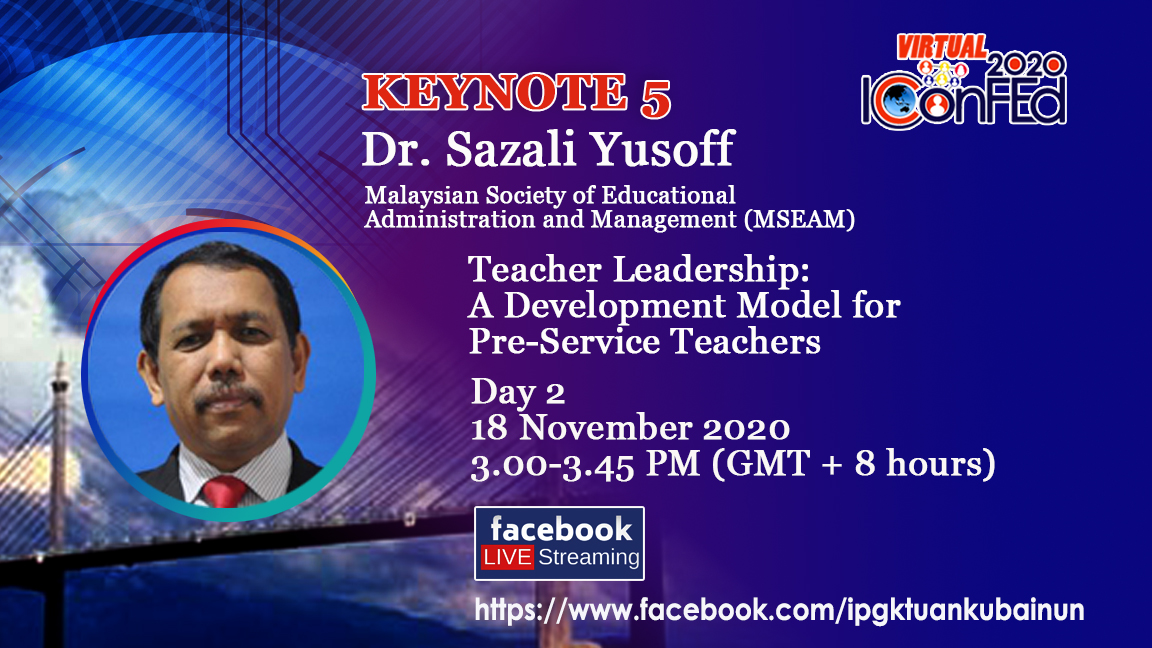
Call for Papers |
| The invited speaker sessions will be broadcast live on the IConFEd 2020 Facebook page https://www.facebook.com/groups on 17 & 18 Nov. 2020 | |||
|
THE FUTURE OF EDUCATION ABSTRACT Keynote speaker biodata (CLICK) |
||
|
EDUCATING 21ST CENTURY TER STEPPING INTO THE FUTURE? Abstract Despite laudable policy initiatives and the pursuit of fresh educational trends (21st Century skills, IR 4.0, Deep Learning, etc.), the fundamental nature of schooling is often at odds with the needs of society and with the skills students need as they transition from schooling to tertiary study or employment. Educational institutions, it has been said, are often the slowest to change. What is the contribution of teacher educators to this situation? They stand in a pivotal position between the past and the future of education; most teacher educators were themselves previously classroom teachers and so bring a wealth of classroom experience to their role. But at the same time, they may inadvertently perpetuate old ways of doing things and so fail to provide the impetus needed to drive educational transformation. So, in this context, what can we expect of teacher educators and how can we assist them to add momentum to the job of moving education forward? In answer, in this talk I want to critically examine the work as teacher educators, exploring themes of criticality, agency, research literacy, innovation and systemic barriers to truly transformational teacher education
Keynote speaker biodata (CLICK) |
||
POSITIVE EDUCATION: BRIDGING THE HUMAN GAP ABSTRACT The human gap is the distance between growing complexity in our world and our propensity to cope with it. Throughout history, human progress meant an increase of knowledge and techniques to deal with an increasing complexity that accompanied that progress. An essential difference today is that complexity, resulting from progress in artificial intelligence and the connecting digital technologies - the Fourth Industrial Revolution, is increasing at an unprecedented rapid rate that we are losing control over it. The only way for us to remain relevant and in control of our technologies is to reach out deeper within and develop our emotional potential, sense of purpose and meaning, and values-led-leadership. Education will need to play a key role in this by building graduates who are not only academically competent but also have the strength of character to carry them through. This is called Positive Education. Keynote speaker biodata (CLICK) |
|||
|
POSITIVE EDUCATION: BRIDGING THE HUMAN GAP ABSTRACT The Covid-19 pandemic has dramatically upended traditional schooling and made remote learning the “new normal.” Teachers around the world are scrambling to offer some form of continuing education using virtual technologies, with the recognition that traditional approaches to curriculum, instruction, assessment, and grading must be altered. The curriculum can be a living and breathing opportunity for taking advantage of teachable moments on very relevant topics. And, surely, we are in such a moment. Noted researcher, Dr. Robert Marzano, declares that a “guaranteed and viable curriculum” is the most significant school level factor impacting student achievement. But what does it mean to have such a curriculum for the modern era considering today's challenging landscape? How do we design and deliver an engaging curriculum, that integrates skills needed for success in this changing landscape and academic standards, that is able to meet the needs of virtual and hybrid instruction models? International UbD trainer and university lecturer, Janelle McGann will explore the following questions:
Keynote speaker biodata (CLICK) |
||
|
TEACHER LEADERSHIP:  A DEVELOPMENT MODEL FOR PRE-SERVICE TEACHERS ABSTRACT The aim of this paper is to explore and develop a teacher leadership development model for pre-service teachers. Studies on in-service teacher leadership, its concept, model, significance and impacts are abound. Nevertheless, literature on models of teacher leadership for pre-service teachers are scarce. Hence, this paper attempts to explore and propose a teacher leadership model for pre-service teachers.
Keynote speaker biodata (CLICK) |
||




